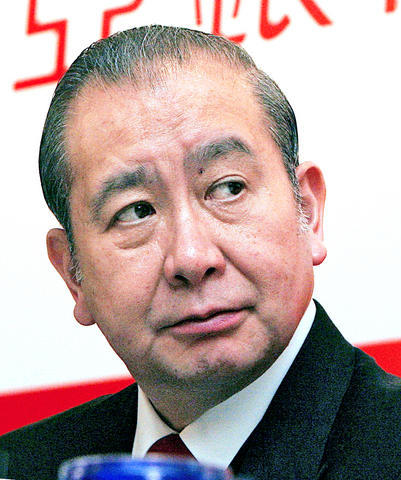A possible lawsuit by US regulators against Hong Kong banker David Li (李國寶) in a Dow Jones & Co insider trading case has rattled high rollers in the city, where Li is a political and business heavyweight.
The US Securities and Exchange Commission has notified Li that it plans to recommend filing civil charges against him.
Li has previously denied giving information to a Hong Kong couple accused of buying a block of Dow Jones stock just before its share price rocketed on news that Rupert Murdoch's News Corp had launched a takeover bid for the company.

PHOTO: AFP
Prosecutors said the couple borrowed funds from Charlotte Leung's (王梁家安) father, identified as Michael Leung Kai Hung (梁啟雄), who has close links with Li, to partly finance the hefty stock purchase.
"I have broken no laws and denied the apparent allegations being made by the staff of the Commission," Li, a Dow Jones board member, has said in a statement.
"I will defend myself vigorously. In the meantime, I will continue to carry out all my business and public duties while defending my good name and reputation," he said.
Li, the head of Hong Kong's largest independent local bank, the family-controlled Bank of East Asia (
He was credited for contributing to banking supervision policy, promoting Hong Kong's financial stability and strengthening its status as a financial center. But the possible lawsuit has cast a shadow over the well-connected businessman.
The looming civil charges could affect his reputation "whether there will be a litigation or not," said James Sung (
The 68-year-old Li was born in London and studied at Cambridge University. His grandfather founded the Bank of East Asia in 1918 and the lender boasts one of the biggest branch networks in China among Hong Kong lenders.
Li's family, one of Hong Kong's most powerful, has been prominent for five generations in business and politics. His younger brother Arthur Li (
Li is also a good friend of Chief Executive Donald Tsang (

MORE VISITORS: The Tourism Administration said that it is seeing positive prospects in its efforts to expand the tourism market in North America and Europe Taiwan has been ranked as the cheapest place in the world to travel to this year, based on a list recommended by NerdWallet. The San Francisco-based personal finance company said that Taiwan topped the list of 16 nations it chose for budget travelers because US tourists do not need visas and travelers can easily have a good meal for less than US$10. A bus ride in Taipei costs just under US$0.50, while subway rides start at US$0.60, the firm said, adding that public transportation in Taiwan is easy to navigate. The firm also called Taiwan a “food lover’s paradise,” citing inexpensive breakfast stalls

TRADE: A mandatory declaration of origin for manufactured goods bound for the US is to take effect on May 7 to block China from exploiting Taiwan’s trade channels All products manufactured in Taiwan and exported to the US must include a signed declaration of origin starting on May 7, the Bureau of Foreign Trade announced yesterday. US President Donald Trump on April 2 imposed a 32 percent tariff on imports from Taiwan, but one week later announced a 90-day pause on its implementation. However, a universal 10 percent tariff was immediately applied to most imports from around the world. On April 12, the Trump administration further exempted computers, smartphones and semiconductors from the new tariffs. In response, President William Lai’s (賴清德) administration has introduced a series of countermeasures to support affected

CROSS-STRAIT: The vast majority of Taiwanese support maintaining the ‘status quo,’ while concern is rising about Beijing’s influence operations More than eight out of 10 Taiwanese reject Beijing’s “one country, two systems” framework for cross-strait relations, according to a survey released by the Mainland Affairs Council (MAC) on Thursday. The MAC’s latest quarterly survey found that 84.4 percent of respondents opposed Beijing’s “one country, two systems” formula for handling cross-strait relations — a figure consistent with past polling. Over the past three years, opposition to the framework has remained high, ranging from a low of 83.6 percent in April 2023 to a peak of 89.6 percent in April last year. In the most recent poll, 82.5 percent also rejected China’s

PLUGGING HOLES: The amendments would bring the legislation in line with systems found in other countries such as Japan and the US, Legislator Chen Kuan-ting said Democratic Progressive Party (DPP) Legislator Chen Kuan-ting (陳冠廷) has proposed amending national security legislation amid a spate of espionage cases. Potential gaps in security vetting procedures for personnel with access to sensitive information prompted him to propose the amendments, which would introduce changes to Article 14 of the Classified National Security Information Protection Act (國家機密保護法), Chen said yesterday. The proposal, which aims to enhance interagency vetting procedures and reduce the risk of classified information leaks, would establish a comprehensive security clearance system in Taiwan, he said. The amendment would require character and loyalty checks for civil servants and intelligence personnel prior to